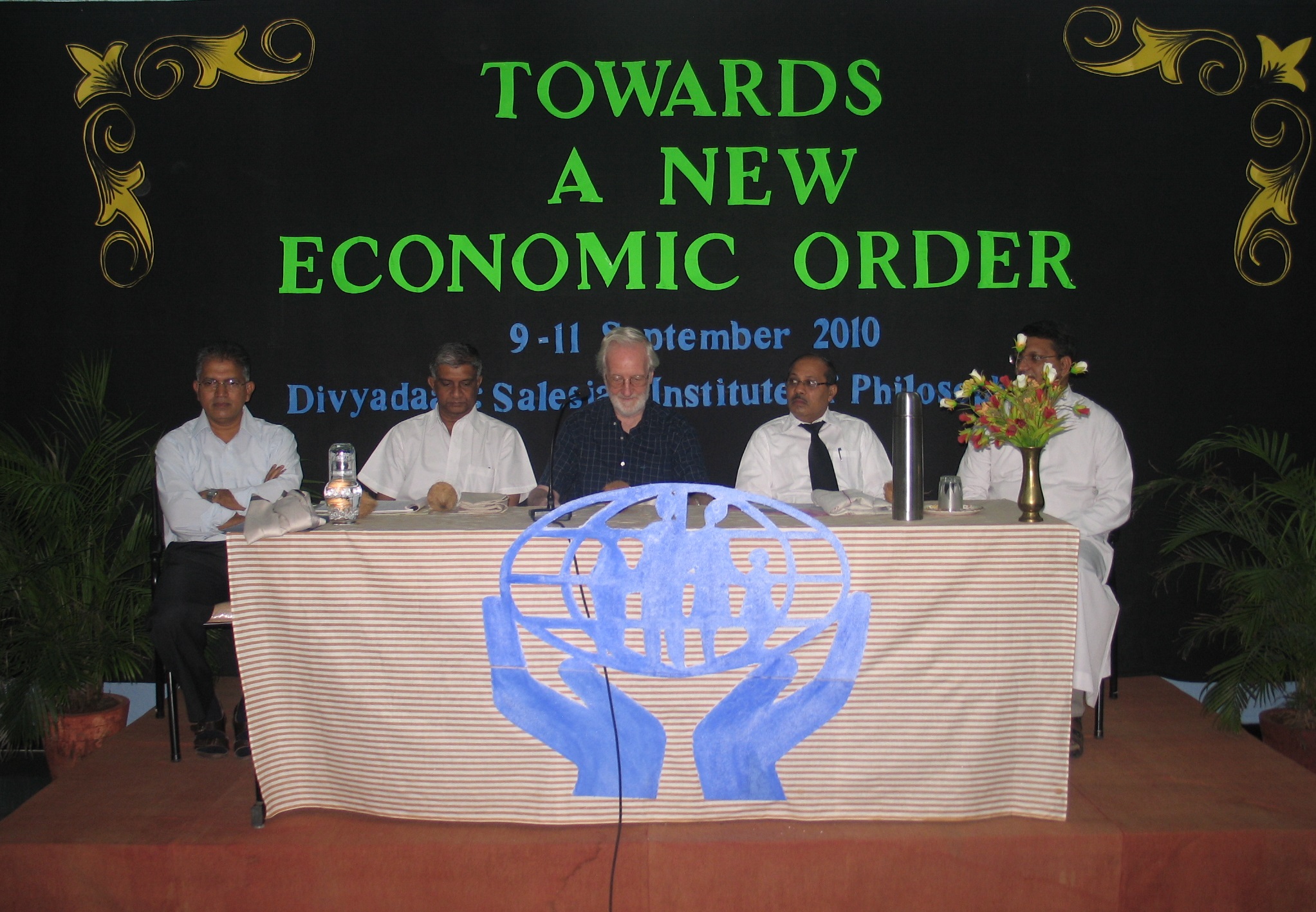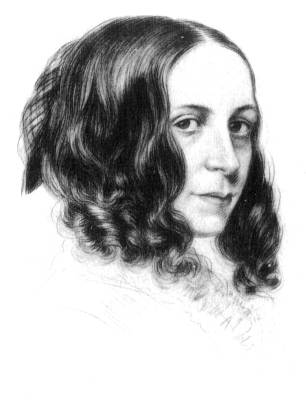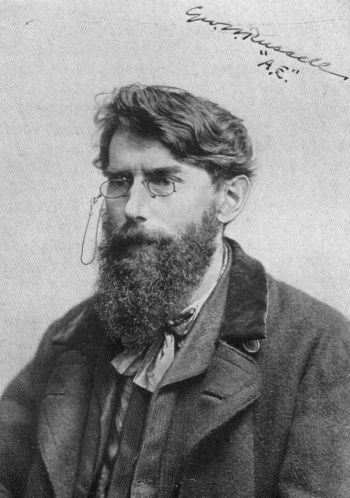|
Philip McShane
Philip McShane (18 February 1932 – 1 July 2020) was an Irish mathematician and philosopher-theologian. Originally trained in mathematics, mathematical physics, and chemistry in the 1950s, he went on to study philosophy from 1956 to 1959. In 1960, after teaching mathematical physics, engineering, and commerce to undergraduates, and special relativity and differential equations to graduate students, McShane began studying theology. He did his fourth year of theology in 1963 and in 1968 began reading economics. In a period that spanned over sixty years, McShane published numerous articles and twenty-five books. His publications range from technical works on the foundations of mathematics, probability theory, evolutionary process, and omnidisciplinary methodology, to introductory texts focusing on critical thinking, linguistics, and economics. He also wrote essays on the philosophy of education. Beginning in 1970, he participated in and helped organize a number of international wor ... [...More Info...] [...Related Items...] OR: [Wikipedia] [Google] [Baidu] |
Bailieborough
Bailieborough or Bailieboro (; ) is a town in County Cavan, Ireland. , its population was 2,683, up from 1,529 as of the 1996 census. Bailieborough's proximity to the N3 road (Ireland), N3 National Road has made it a commuter town. History Plantation Before the Plantation of Ulster, the area covered by the town was known as Killechally, Killycolly and Killycollie (). The modern town was founded by William Bailie, a Scottish people, Scottish planter who was granted the lands of Tonergie (Tandragee) in East Breifne by James VI and I, James I, the King of England. This area was known as the Barony of Clankee, later known as Bailieburrow. The conditions of being granted these lands were that within 2 years Bailie had to have constructed a house and bawn for himself, along with building tenant houses so he could collect revenue in the form of rent. An annuity would have to be paid to the English monarch, this annuity would also be reduced if Bailie gave preference to settling Sco ... [...More Info...] [...Related Items...] OR: [Wikipedia] [Google] [Baidu] |
Lochlainn O'Raifeartaigh
Lochlainn O'Raifeartaigh (; 11 March 1933 – 18 November 2000) was an Irish physicist in the field of theoretical particle physics. He is best known for the O'Raifeartaigh Theorem, a result in unification theory, and the O'Raifeartaigh Model of supersymmetry breaking. O'Raifeartaigh was born in Clontarf, Dublin in 1933, and attended St. Joseph's C.B.S. in Fairview and Castleknock College. Most of his scientific career was centred on that city, where he obtained his first degrees at University College Dublin (BA in 1953 and MSc in Mathematical Physics in 1956), and spent from 1968 until his death as Senior Professor at the Dublin Institute for Advanced Studies. He obtained his doctorate from the University of Zurich in 1960, under Walter Heitler. He also visited many institutions, notably Madras, IHES Bures, and the Institute for Advanced Study in Princeton, New Jersey, but it was during an extended stay at Syracuse University (1964-8) that he made the discovery that es ... [...More Info...] [...Related Items...] OR: [Wikipedia] [Google] [Baidu] |
William Shakespeare
William Shakespeare ( 26 April 1564 – 23 April 1616) was an English playwright, poet and actor. He is widely regarded as the greatest writer in the English language and the world's pre-eminent dramatist. He is often called England's national poet and the " Bard of Avon" (or simply "the Bard"). His extant works, including collaborations, consist of some 39 plays, 154 sonnets, three long narrative poems, and a few other verses, some of uncertain authorship. His plays have been translated into every major living language and are performed more often than those of any other playwright. He remains arguably the most influential writer in the English language, and his works continue to be studied and reinterpreted. Shakespeare was born and raised in Stratford-upon-Avon, Warwickshire. At the age of 18, he married Anne Hathaway, with whom he had three children: Susanna, and twins Hamnet and Judith. Sometime between 1585 and 1592, he began a successful career in London as an ... [...More Info...] [...Related Items...] OR: [Wikipedia] [Google] [Baidu] |
Elizabeth Barrett Browning
Elizabeth Barrett Browning (née Moulton-Barrett; 6 March 1806 – 29 June 1861) was an English poet of the Victorian era, popular in Britain and the United States during her lifetime. Born in County Durham, the eldest of 12 children, Elizabeth Barrett wrote poetry from the age of eleven. Her mother's collection of her poems forms one of the largest extant collections of juvenilia by any English writer. At 15, she became ill, suffering intense head and spinal pain for the rest of her life. Later in life, she also developed lung problems, possibly tuberculosis. She took laudanum for the pain from an early age, which is likely to have contributed to her frail health. In the 1840s, Elizabeth was introduced to literary society through her distant cousin and patron John Kenyon. Her first adult collection of poems was published in 1838, and she wrote prolifically between 1841 and 1844, producing poetry, translation, and prose. She campaigned for the abolition of slavery, and her w ... [...More Info...] [...Related Items...] OR: [Wikipedia] [Google] [Baidu] |
James Clerk Maxwell
James Clerk Maxwell (13 June 1831 – 5 November 1879) was a Scottish mathematician and scientist responsible for the classical theory of electromagnetic radiation, which was the first theory to describe electricity, magnetism and light as different manifestations of the same phenomenon. Maxwell's equations for electromagnetism have been called the " second great unification in physics" where the first one had been realised by Isaac Newton. With the publication of "A Dynamical Theory of the Electromagnetic Field" in 1865, Maxwell demonstrated that electric and magnetic fields travel through space as waves moving at the speed of light. He proposed that light is an undulation in the same medium that is the cause of electric and magnetic phenomena. (This article accompanied an 8 December 1864 presentation by Maxwell to the Royal Society. His statement that "light and magnetism are affections of the same substance" is at page 499.) The unification of light and electrical ... [...More Info...] [...Related Items...] OR: [Wikipedia] [Google] [Baidu] |
Ludwig Van Beethoven
Ludwig van Beethoven (baptised 17 December 177026 March 1827) was a German composer and pianist. Beethoven remains one of the most admired composers in the history of Western music; his works rank amongst the most performed of the classical music repertoire and span the transition from the Classical period to the Romantic era in classical music. His career has conventionally been divided into early, middle, and late periods. His early period, during which he forged his craft, is typically considered to have lasted until 1802. From 1802 to around 1812, his middle period showed an individual development from the styles of Joseph Haydn and Wolfgang Amadeus Mozart, and is sometimes characterized as heroic. During this time, he began to grow increasingly deaf. In his late period, from 1812 to 1827, he extended his innovations in musical form and expression. Beethoven was born in Bonn. His musical talent was obvious at an early age. He was initially harshly and intensively tau ... [...More Info...] [...Related Items...] OR: [Wikipedia] [Google] [Baidu] |
The Buddha
Siddhartha Gautama, most commonly referred to as the Buddha, was a wandering ascetic and religious teacher who lived in South Asia during the 6th or 5th century BCE and founded Buddhism. According to Buddhist tradition, he was born in Lumbini, in what is now Nepal, to royal parents of the Shakya clan, but renounced his home life to live as a wandering ascetic ( sa, śramaṇa). After leading a life of begging, asceticism, and meditation, he attained enlightenment at Bodh Gaya in what is now India. The Buddha thereafter wandered through the lower Indo-Gangetic Plain, teaching and building a monastic order. He taught a Middle Way between sensual indulgence and severe asceticism, leading to Nirvana, that is, freedom from ignorance, craving, rebirth, and suffering. His teachings are summarized in the Noble Eightfold Path, a training of the mind that includes meditation and instruction in Buddhist ethics such as right effort, mindfulness, and ''jhana''. He died in Kus ... [...More Info...] [...Related Items...] OR: [Wikipedia] [Google] [Baidu] |
Eric Voegelin
Eric Voegelin (born Erich Hermann Wilhelm Vögelin, ; 1901–1985) was a German-American political philosopher. He was born in Cologne, and educated in political science at the University of Vienna, where he became an associate professor of political science in the law faculty. In 1938, he and his wife fled from the Nazi forces which had entered Vienna. They emigrated to the United States, where they became citizens in 1944. He spent most of his academic career at Louisiana State University, the University of Munich and the Hoover Institution of Stanford University. Early life Although he was born in Cologne on January 3, 1901, his parents moved to Vienna in 1910, and he eventually studied at the University of Vienna. The advisers on his dissertation were Hans Kelsen and Othmar Spann. After his habilitation there in 1928, he taught political theory and sociology. In Austria, Voegelin began lasting friendships with Alfred Schütz and with F. A. Hayek. Career As a result of the An ... [...More Info...] [...Related Items...] OR: [Wikipedia] [Google] [Baidu] |
Arnold J
Arnold may refer to: People * Arnold (given name), a masculine given name * Arnold (surname), a German and English surname Places Australia * Arnold, Victoria, a small town in the Australian state of Victoria Canada * Arnold, Nova Scotia United Kingdom * Arnold, East Riding of Yorkshire * Arnold, Nottinghamshire United States * Arnold, California, in Calaveras County * Arnold, Carroll County, Illinois * Arnold, Morgan County, Illinois * Arnold, Iowa * Arnold, Kansas * Arnold, Maryland * Arnold, Mendocino County, California * Arnold, Michigan * Arnold, Minnesota * Arnold, Missouri * Arnold, Nebraska * Arnold, Ohio * Arnold, Pennsylvania * Arnold, Texas * Arnold, Brooke County, West Virginia * Arnold, Lewis County, West Virginia * Arnold, Wisconsin * Arnold Arboretum of Harvard University, Massachusetts * Arnold Township, Custer County, Nebraska Other uses * Arnold (automobile), a short-lived English car * Arnold of Manchester, a former English coachbuilder * Arnold (band), ... [...More Info...] [...Related Items...] OR: [Wikipedia] [Google] [Baidu] |
Karl Jaspers
Karl Theodor Jaspers (, ; 23 February 1883 – 26 February 1969) was a German-Swiss psychiatrist and philosopher who had a strong influence on modern theology, psychiatry, and philosophy. After being trained in and practicing psychiatry, Jaspers turned to philosophical inquiry and attempted to discover an innovative philosophical system. He was often viewed as a major exponent of existentialism in Germany, though he did not accept the label. Biography Jaspers was born in Oldenburg in 1883 to a mother from a local farming community, and a jurist father. He showed an early interest in philosophy, but his father's experience with the legal system undoubtedly influenced his decision to study law at the University of Heidelberg. Jaspers first studied law in Heidelberg and later in Munich for three semesters. It soon became clear that Jaspers did not particularly enjoy law, and he switched to studying medicine in 1902 with a thesis about criminology. In 1910 he married Gertrud Maye ... [...More Info...] [...Related Items...] OR: [Wikipedia] [Google] [Baidu] |
Anton Bruckner
Josef Anton Bruckner (; 4 September 182411 October 1896) was an Austrian composer, organist, and music theorist best known for his symphonies, masses, Te Deum and motets. The first are considered emblematic of the final stage of Austro-German Romanticism because of their rich harmonic language, strongly polyphonic character, and considerable length. Bruckner's compositions helped to define contemporary musical radicalism, owing to their dissonances, unprepared modulations, and roving harmonies. Unlike other musical radicals such as Richard Wagner and Hugo Wolf, Bruckner showed extreme humility before other musicians, Wagner in particular. This apparent dichotomy between Bruckner the man and Bruckner the composer hampers efforts to describe his life in a way that gives a straightforward context for his music. Hans von Bülow described him as "half genius, half simpleton". Bruckner was critical of his own work and often reworked his compositions. There are several version ... [...More Info...] [...Related Items...] OR: [Wikipedia] [Google] [Baidu] |
Patrick Kavanagh
Patrick Kavanagh (21 October 1904 – 30 November 1967) was an Irish poet and novelist. His best-known works include the novel '' Tarry Flynn'', and the poems "On Raglan Road" and "The Great Hunger". He is known for his accounts of Irish life through reference to the everyday and commonplace. Life and work Early life Patrick Kavanagh was born in rural Inniskeen, County Monaghan, in 1904, the fourth of ten children of James Kavanagh and Bridget Quinn. His grandfather was a schoolteacher called "Kevany", which a local priest changed to " Kavanagh" at his baptism. The grandfather had to leave the area following a scandal and never taught in a national school again, but married and raised a family in Tullamore. Patrick Kavanagh's father, James, was a cobbler and farmer. Kavanagh's brother Peter became a university professor and writer, two of their sisters were teachers, three became nurses, and one became a nun. Patrick Kavanagh was a pupil at Kednaminsha National School from 190 ... [...More Info...] [...Related Items...] OR: [Wikipedia] [Google] [Baidu] |






.jpg)


